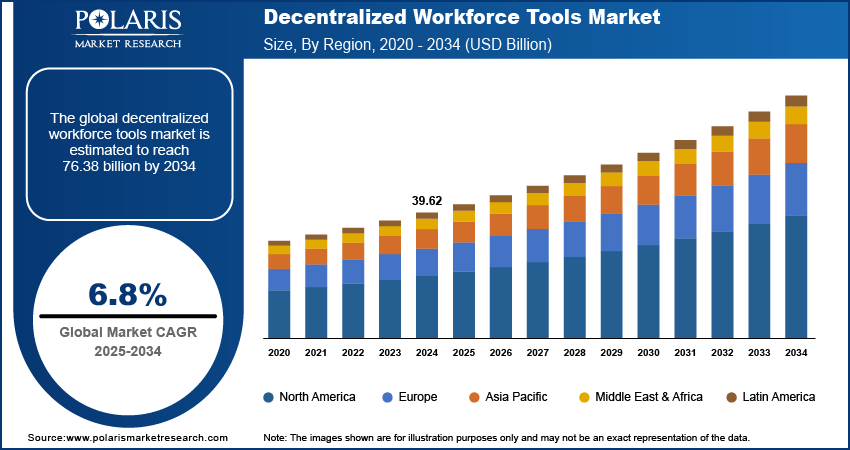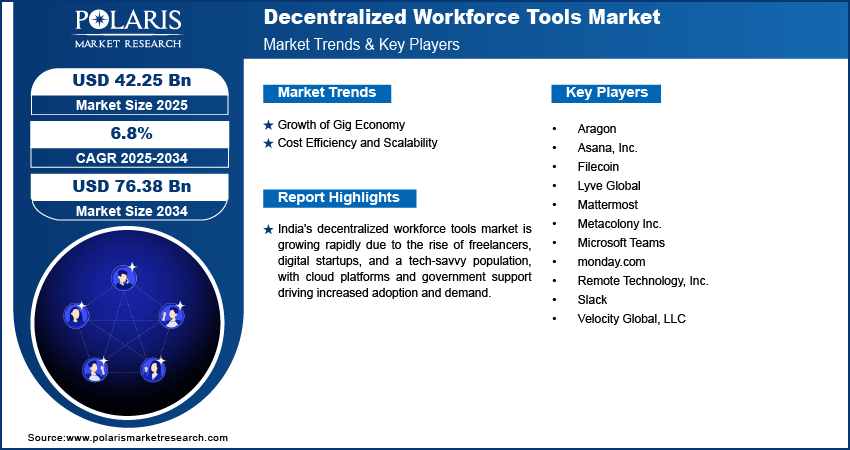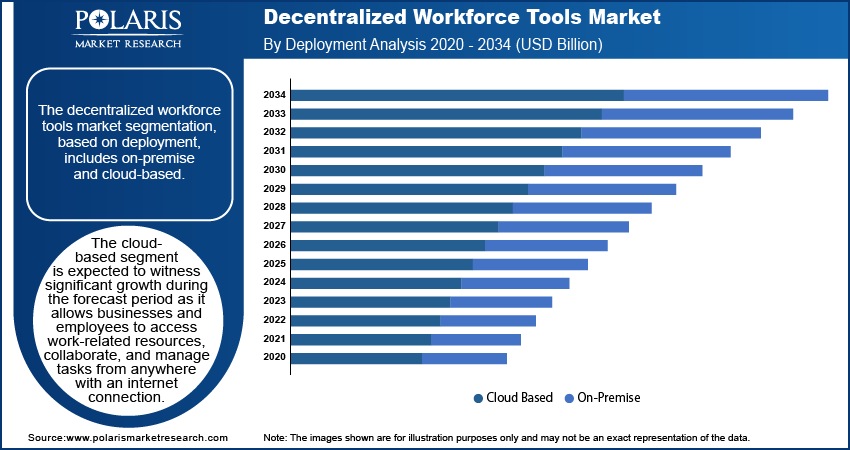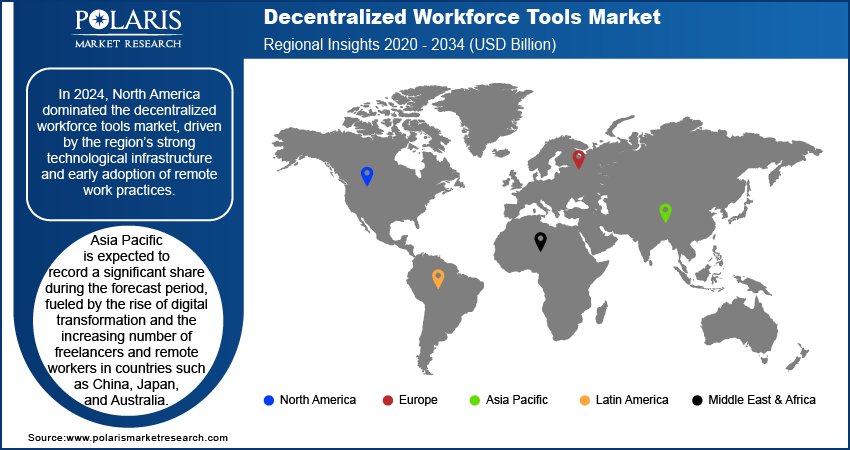
Decentralized Workforce Tools Market Size, Share, Trends, Industry Analysis Report
: By Type, Deployment (Cloud and On-Premise), Organization Size, End-Use Industry, and Region (North America, Europe, Asia Pacific, Latin America, and Middle East & Africa) – Market Forecast, 2025–2034
- Published Date:May-2025
- Pages: 125
- Format: PDF
- Report ID: PM5594
- Base Year: 2024
- Historical Data: 2020-2023
Decentralized Workforce Tools Market Overview
The global decentralized workforce tools market size was valued at USD 39.62 billion in 2024. The market is projected to grow from USD 42.25 billion in 2025 to USD 76.38 billion by 2034, exhibiting a CAGR of 6.8% during 2025–2034.
Decentralized workforce tools are platforms that enable workers to operate independently without relying on a central authority or traditional employer. These tools often include features such as flexible payment systems, global collaboration, and access to benefits typically reserved for full-time employees.
The shift toward remote and hybrid work has accelerated in recent years, especially after the COVID-19 pandemic. According to the UK National Office of Statistics, in the autumn of 2024, more than a quarter of the working adult population in Great Britain was engaged in hybrid work arrangements. More companies are embracing remote work as a long-term strategy, allowing employees to work from anywhere. Businesses need tools that can support decentralized teams effectively as remote work becomes the norm. These tools provide workers with the necessary resources to collaborate, communicate, and manage tasks without being in the same physical location. Decentralized workforce tools are increasingly essential for companies and workers alike with the growing demand for remote work options, thereby driving the decentralized workforce tools market development.

To Understand More About this Research: Request a Free Sample Report
Technological advancements, particularly in cloud computing, artificial intelligence (AI), and blockchain, have significantly impacted the way decentralized workforce tools operate. Cloud-based platforms enable workers to access files, communicate, and collaborate from any location, ensuring flexibility. AI is helping automate routine tasks and improve decision-making, making work more efficient for decentralized teams. Blockchain technology offers secure, transparent transactions, which is especially important in managing digital payments and contracts across borders. These advancements are creating tools that can scale and operate securely in a decentralized environment, making them more appealing to businesses and workers, which is driving the decentralized workforce tools market demand.
Decentralized Workforce Tools Market Dynamics
Growth of Gig Economy
The gig economy has seen massive growth in recent years, with more people opting for freelance, contract, or temporary work instead of traditional full-time employment. According to Velocity Global, approximately 59 million individuals in the US engage in freelance work, representing 36% of the overall American labor force. This shift has led to an increased need for tools that cater specifically to independent workers. Decentralized workforce tools are designed to offer freelancers and contractors the same benefits and support as full-time employees, such as income management, and networking opportunities. These platforms help freelancers manage multiple clients, track payments, and access benefits that were once only available to those in traditional job roles. Owing to all these benefits, decentralized workforce tools are increasingly being used in the gig economy. Therefore, the growth of the gig economy propels the decentralized workforce tools market demand.
Cost Efficiency and Scalability
Decentralized workforce tools help businesses reduce overhead costs associated with traditional office spaces, employee benefits, and administrative tasks. The report of Metro Offices, which provide working spaces and services, states that private offices cost around USD 500–USD 2,000+ per day, showcasing the high cost of operation in traditional office spaces. Companies are eliminating expenses related to office maintenance, utilities, and commuting by allowing workers to operate from anywhere, due to which the demand for workforce decentralization tools is rising. These tools also provide scalable solutions that grow with the company, enabling businesses to hire as needed without the complexity of onboarding full-time employees. The flexibility and cost-saving benefits make decentralized workforce tools an attractive option for companies looking to streamline operations while maintaining productivity. Hence, the benefits of decentralized workforce tools, such as cost efficiency and scalability, contribute to the decentralized workforce tools market opportunities.

Decentralized Workforce Tools Market Segment Analysis
Decentralized Workforce Tools Market Assessment by Deployment Outlook
The decentralized workforce tools market segmentation, based on deployment, includes on-premise and cloud-based. According to the decentralized workforce tools market statistics, the cloud-based segment is expected to witness significant growth during the forecast period. Cloud-based tools allow businesses and employees to access work-related resources, collaborate, and manage tasks from anywhere with an internet connection. This flexibility makes cloud solutions ideal for decentralized teams spread across different locations. Additionally, cloud-based platforms offer scalability, security, and cost-effectiveness, making them highly attractive to organizations looking to manage remote workforces efficiently, thereby driving the segmental growth.
Decentralized Workforce Tools Market Evaluation by Type Outlook
The decentralized workforce tools market segmentation, based on type, includes communication tools, project & task management, time & productivity tracking, HR & payroll, and others. The communication tools segment dominated the decentralized workforce tools market share in 2024. Effective communication is crucial for managing distributed teams as remote work becomes more common. Communication tools such as video conferencing, instant messaging, and collaboration platforms help teams stay connected, regardless of their location. These tools enable seamless interaction, project updates, and quick problem-solving, which are essential for productivity in a decentralized environment. The growing need for real-time communication among remote workers and across different time zones is driving the dominance of this segment in the global market.

Decentralized Workforce Tools Market Regional Analysis
By region, the study provides the decentralized workforce tools market insights into North America, Europe, Asia Pacific, Latin America, and the Middle East & Africa. In 2024, North America dominated the decentralized workforce tools market revenue share driven by the region’s strong technological infrastructure and early adoption of remote work practices. The US, in particular, has a large number of startups, tech companies, and remote workers, all of which contribute to the growing demand for decentralized workforce solutions. Businesses in North America are embracing cloud-based tools, flexible work arrangements, and digital platforms to manage their distributed teams effectively. The increasing popularity of the gig economy and the shift toward a more autonomous work culture are further driving the decentralized workforce tools market expansion in North America.
Asia Pacific is expected to record a significant share during the forecast period, fueled by the rising digital transformation and the increasing number of freelancers and remote workers in countries such as China, Japan, and Australia. Many businesses in the region are adopting cloud-based solutions to support their diverse, geographically dispersed teams. The region’s growing focus on technology and innovation, alongside a large and young workforce seeking flexible job opportunities, has led to higher demand for decentralized workforce tools, thereby driving the Asia Pacific decentralized workforce tools market growth.
The India decentralized workforce tools market is experiencing substantial growth, with a large number of skilled professionals opting for freelance and remote work due to rising number of remote workplace services. The rise of digital startups and the growing tech-savvy population are driving this demand. Indian businesses and freelancers are increasingly adopting cloud-based platforms and decentralized tools to manage projects, collaborate, and track payments efficiently. The country’s strong IT sector and favorable government initiatives aimed at supporting the gig economy also play a major role in the adoption of decentralized workforce tools.

Decentralized Workforce Tools Market – Key Players & Competitive Analysis Report
The decentralized workforce tools market opportunity is constantly evolving, with numerous companies striving to innovate and distinguish themselves. Leading global corporations dominate the market by leveraging extensive research and development, and advanced techniques. These companies pursue strategic initiatives such as mergers and acquisitions, partnerships, and collaborations to enhance their product offerings and expand into new markets.
New companies are impacting the decentralized workforce tools market trends by introducing innovative products to meet the demand of specific sectors. This competitive trend is amplified by continuous progress in product offerings. A few major players in the market are Lyve Global; Mattermost; Aragon; Metacolony Inc.; Velocity Global, LLC; Remote Technology, Inc.; Filecoin; monday.com; Microsoft Teams; Slack; and Asana, Inc.
Velocity Global, LLC, a company based in Denver, Colorado, provides global workforce solutions. Founded in 2014 by Ben Wright, it specializes in Employer of Record (EOR) services and workforce management. The company helps businesses manage global hiring, payroll, compliance, and retention by utilizing its technology platform. Velocity Global offers a range of services related to international human capital management. Its Employer of Record (EOR) service acts as the legal employer for workers in 185+ countries, ensuring compliance with local laws. The company also provides global payroll services that aggregate payroll processes worldwide for streamlined payment processing. Additionally, it manages global benefits administration across different jurisdictions and facilitates immigration services to ensure compliance with visa requirements. Velocity Global also assists with independent contractor compliance and offers support for cross-border mergers and acquisitions involving international teams. The company operates in 185+ countries, with wholly-owned entities in 63 nations. It has offices in major cities such as Denver (HQ), Amsterdam, Singapore, Dubai, London, Paris, Toronto, Sydney, Hong Kong, and Bangalore. This extensive presence allows Velocity Global to provide localized support while maintaining centralized operations.
Asana, Inc. is a software company based in San Francisco, California, founded in 2008. The company focuses on developing tools to help teams manage their work more effectively. Asana provides a work management platform that allows teams to organize tasks, track progress, and collaborate on projects. The platform includes features such as task tracking, workflow management, and project planning tools. It is used across various industries, such as marketing, engineering, sales, finance, human resources, IT, and design. Asana offers different subscription plans to accommodate the needs of various organizations. Its clients include well-known companies such as Uber, Sony, Facebook, Slack, and MailChimp. Asana operates globally, with a presence in over 190 countries and offices in key locations such as the US (San Francisco, Chicago, and New York City), Europe (Dublin, London, Munich, Paris, and Reykjavik), and Australia (Sydney). The company supports a large user base worldwide, including numerous paying organizations.
List of Key Companies in Decentralized Workforce Tools Market
- Aragon
- Asana, Inc.
- Filecoin
- Lyve Global
- Mattermost
- Metacolony Inc.
- Microsoft Teams
- monday.com
- Remote Technology, Inc.
- Slack
- Velocity Global, LLC
Decentralized Workforce Tools Industry Development
In November 2024, Craftt’s USD 2 billion seed funding round was successfully closed, led by Superscrypt with DCG and angel investors. The decentralized workforce platform’s development and ecosystem growth were accelerated through this funding milestone.
Decentralized Workforce Tools Market Segmentation
By Type Outlook (Revenue USD Billion, 2020–2034)
- Communication Tools
- Project & Task Management
- Time & Productivity Tracking
- HR & Payroll
- Others
By Deployment Outlook (Revenue USD Billion, 2020–2034)
- On-Premise
- Cloud-Based
By Organization Size Outlook (Revenue USD Billion, 2020–2034)
- SMEs
- Large Enterprises
By End-Use Industry Outlook (Revenue USD Billion, 2020–2034)
- IT
- Finance
- Healthcare
- Others
By Regional Outlook (Revenue USD Billion, 2020–2034)
- North America
- US
- Canada
- Europe
- Germany
- France
- UK
- Italy
- Spain
- Netherlands
- Russia
- Rest of Europe
- Asia Pacific
- China
- Japan
- India
- Malaysia
- South Korea
- Indonesia
- Australia
- Rest of Asia Pacific
- Middle East & Africa
- Saudi Arabia
- UAE
- Israel
- South Africa
- Rest of Middle East & Africa
- Latin America
- Mexico
- Brazil
- Argentina
- Rest of Latin America
Decentralized Workforce Tools Market Report Scope
|
Report Attributes |
Details |
|
Market Size Value in 2024 |
USD 39.62 billion |
|
Market Size Value in 2025 |
USD 42.25 billion |
|
Revenue Forecast by 2034 |
USD 76.38 billion |
|
CAGR |
6.8% from 2025 to 2034 |
|
Base Year |
2024 |
|
Historical Data |
2020–2023 |
|
Forecast Period |
2025–2034 |
|
Quantitative Units |
Revenue in USD billion and CAGR from 2025 to 2034 |
|
Report Coverage |
Revenue Forecast, Market Competitive Landscape, Growth Factors, and Trends |
|
Segments Covered |
|
|
Regional Scope |
|
|
Competitive Landscape |
|
|
Report Format |
|
|
Customization |
Report customization as per your requirements with respect to countries, regions, and segmentation. |
FAQ's
The decentralized workforce tools market size was valued at USD 39.62 billion in 2024 and is projected to grow to USD 76.38 billion by 2034.
The global market is projected to register a CAGR of 6.8% during the forecast period.
North America held the largest share of the global market in 2024.
A few key players in the market are Lyve Global; Mattermost; Aragon; Metacolony Inc.; Velocity Global, LLC; Remote Technology, Inc.; Filecoin; monday.com; Microsoft Teams; Slack; and Asana, Inc.
The communication tools segment dominated the market in 2024.
The cloud-based segment is expected to witness significant growth during the forecast period as it allows businesses and employees to access work-related resources, collaborate, and manage tasks from anywhere with an internet connection.
